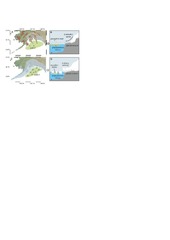Blar i forfatter "März, Christian"
-
Biogeochemical consequences of a changing Arctic shelf seafloor ecosystem
März, Christian; Freitas, Felipe; Faust, Johan Christoph; Godbold, Jasmin A.; Tessin, Alyson; Abbott, Geoffrey D.; Airs, Ruth; Arndt, Sandra; Barnes, David K.A.; Grange, Laura; Gray, Neil; Head, Ian M.; Hendry, Katharine R; Hilton, Robert; Reed, Adam J.; Ruhl, Saskia; Solan, Martin; Stevenson, Mark A; Tait, Karen; Ward, James M.; Widdicombe, Stephen; Souster, Terri A. (Journal article; Tidsskriftartikkel; Peer reviewed, 2021-10-09)Unprecedented and dramatic transformations are occurring in the Arctic in response to climate change, but academic, public, and political discourse has disproportionately focussed on the most visible and direct aspects of change, including sea ice melt, permafrost thaw, the fate of charismatic megafauna, and the expansion of fisheries. Such narratives disregard the importance of less visible and ... -
Cordilleran ice-sheet growth fueled primary productivity in the Gulf of Alaska, northeast Pacific Ocean
Müller, Juliane; Romero, Oscar; Cowan, Ellen A.; McClymont, Erin L.; Forwick, Matthias; Asahi, Hirofumi; März, Christian; Moy, Christopher M.; Suto, Itsuki; Mix, Alan; Stoner, Joseph (Journal article; Tidsskriftartikkel; Peer reviewed, 2018-02-15)Fertilization of the ocean by eolian dust and icebergs is an effective mechanism to enhance primary productivity. In particular, high-nutrient, low-chlorophyll (HNLC) areas where phytoplankton growth is critically iron-limited, such as the subarctic Pacific Ocean and the Southern Ocean, are proposed to respond to increases in bioavailable Fe supply with enhanced phytoplankton productivity and carbon ... -
Does Arctic warming reduce preservation of organic matter in Barents Sea sediments?
Faust, Johan Christoph; Stevenson, Mark A.; Abbott, Geoffrey D.; Knies, Jochen; Tessin, Allyson; Mannion, Isobel; Ford, Ailbe; Hilton, Robert; Peakall, Jeffrey; März, Christian (Journal article; Tidsskriftartikkel; Peer reviewed, 2020-08-31)Over the last few decades, the Barents Sea experienced substantial warming, an expansion of relatively warm Atlantic water and a reduction in sea ice cover. This environmental change forces the entire Barents Sea ecosystem to adapt and restructure and therefore changes in pelagic–benthic coupling, organic matter sedimentation and long-term carbon sequestration are expected. Here we combine new and ...


 English
English norsk
norsk

